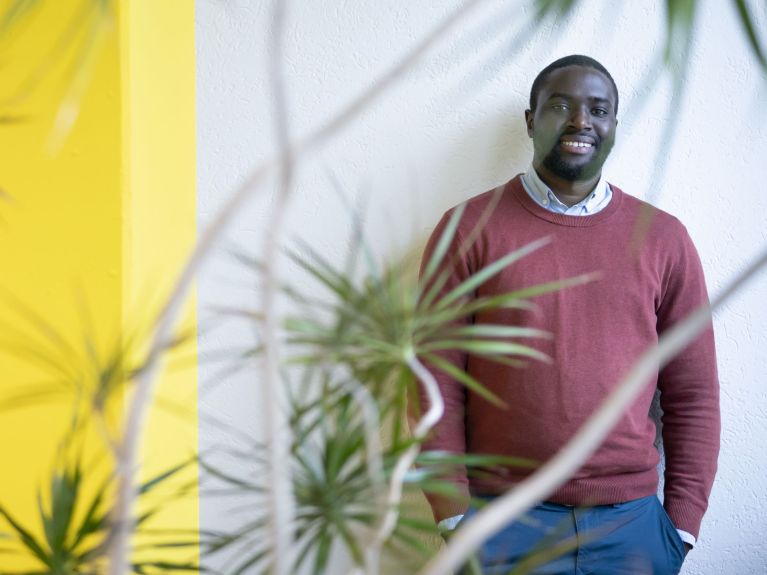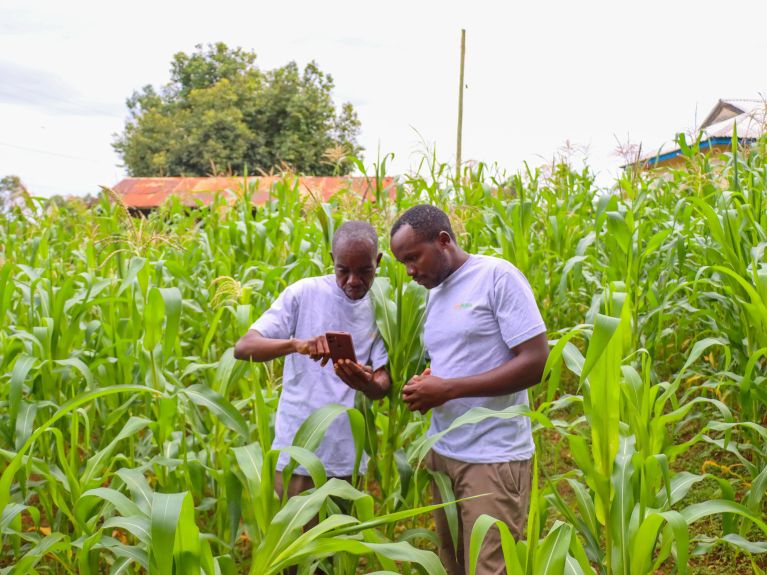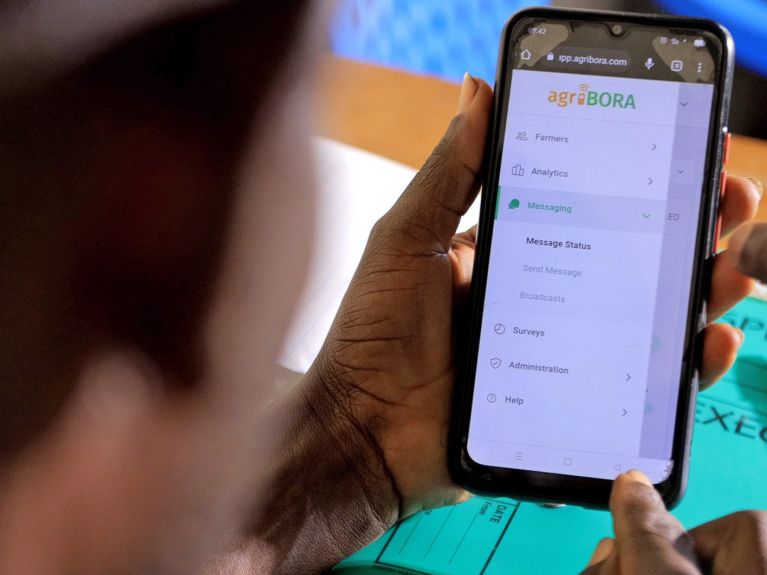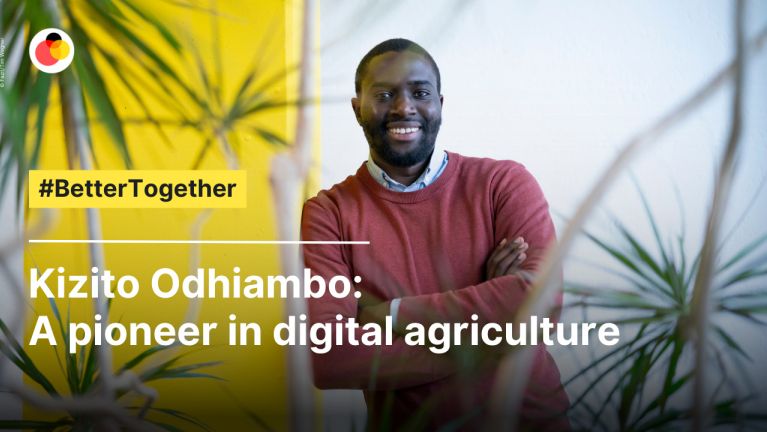A pioneer in digital agriculture
Smallholders are vital to food security in Africa. Kizito Odhiambo is helping to boost their profits through his German-Kenyan startup.

Some people live to build international networks. We’d like you to meet some people who symbolise Germany’s partnerships around the world. After all, global challenges can only be overcome by if we work together.
Is having your own garden one of life’s little pleasures? Kizito Odhiambo grins at the suggestion, as the idea of spending his weekends in a German allotment clearing weeds, planting fruit seeds and harvesting vegetable makes him laugh out loud. “No, no,” he says. “We did have our own garden, but I really don’t have green fingers.”
Dieses YouTube-Video kann in einem neuen Tab abgespielt werden
YouTube öffnenThird party content
We use YouTube to embed content that may collect data about your activity. Please review the details and accept the service to see this content.
Open consent formThat may surprise you, as the 33-year-old Kenyan has set up a fintech startup in the Rhine-Main region which is all about cultivating vegetables, crops and pulses on small plots. But it has very little to do with German allotments. The name of the digital platform is agriBORA, and it helps smallholders in Kenya to improve their harvests.
Agriculture is key to food security in Kenya

Agriculture is a key factor in the Kenyan economy. Many people make their living as smallholders. The food they grow not only feeds their families but also provides a source of income. Their lives and the lives of their families depend on agriculture. However, climate change often causes harvests to fluctuate, putting farmers’ livelihoods at risk and threatening food security in Kenya.
How agriBORA is bolstering agriculture in Kenya
The name “agriBORA” is a combination of the Greek word “agros”, meaning “field” and the Swahili word “bora”, which means better. The startup is helping provide greater security in cultivating crops and protect people’s incomes. The startup connects smallholders via a platform and provides information and weather forecasts. This allows users to identify the best time to sow and harvest. To do this, agriBORA uses data from European Space Agency (ESA) satellites. The European Space Operations Centre is just down the road fro Kizito Odhiambo’s office in Darmstadt. “The ESA is a major funder of agriBORA,” Odhiambo says. “We’re already in our third funding round and we receive support from the European Space Agency. We also have backing from German investors.”
Studying in Germany after a year’s voluntary service

The fact that he now works in agriculture continues to surprise Odhiambo. After finishing school in Kenya he decided to undertake a year’s voluntary service in an institution for children and young people with learning difficulties in North Germany. “The institution was happy to keep me on, but I had another plan,” he recalls. “I wanted to build cars and, since Germany is famous for its automotive industry, I decided to study engineering in Darmstadt.During his studies he had a part-time trainee job at the carmaker Opel. He sent some of his salary home to his mother in Kenya, who was building up her business as a smallholder near Lake Victoria. She used the money to buy seeds and fertiliser.
“When I visited her I noticed how much she could improve and how much she could increase her profits. That was the engineer in me coming out,” he says.He realised that if his mother and other smallholders could access weather data, they could time their sowing and harvests accordingly. He also identified a business model. His idea was to provide information to smallholders via text message and charge a small fee for the service. “My mum liked the idea and we organised a meeting with other smallholders. One of them suddenly stood up and said she liked the idea, but she would never pay for information.”
Fintech platform for the agricultural sector
That smallholder needed the money to buy seeds, and she also really needed someone to take the harvest off her. “Her name was Clementine. Even today I am still grateful for her objection, as it sowed the seed of the business idea which emerged later,” Odhiambo says. “It’s about much more than reliable weather information. There must be structures for smallholders to connect with each other, such people who sell seeds or fertilisers, and especially people who will buyers for their harvests,” he explains. He also stresses that if you want to make a living from agriculture, you usually need a small amount of capital to get you started. However, he explains that banks are often reluctant to provide microcredits to smallholders. “One reason for that is because they lack information and details about the potential borrower,” Odhiambo says.
Start-up loans

He wants to use the agriBORA fintech platform to solve this problem. Odhiambo remembers George, a man who, like his mother, lives by Lake Victoria. “George wanted to open a shop to sell products for smallholders: tools, seeds, fertilisers and so on. But he lacked the start-up capital to furnish his shop and buy stock.”In cases like George’s, agriBORA provides loans worth €300. It allowed George to open his shop and now he uses agriBORA to let his customers know what he offers. Smallholders like Clementine buy from him, sowing their seeds when the weather is favourable. Then they harvest at a good time and sell their harvests to George, who in turn sells the produce in his shop.
“People like George and Clementine can use our platform to record their purchases. This creates transparency and it can be important when taking out bigger loans from a bank,” Odhiambo explains. Over 12,000 people have registered on agriBORA so far, and 60% of them are women.
Improving access to food around the world
What started out as a business idea has grown into a small startup within a few years. agriBORA now employs 20 permanent staff in Germany and Kenya. Alongside Managing Director Kizito Odhiambo, four people work in Germany. “They are mainly involved in data management and the software. Our employees in Kenya primarily work in sales and business development,” Odhiambo explains. He lives in Germany with his wife and children and regularly travels to Kenya. “Culturally I move between two different worlds, and sometimes that isn’t all that easy. However, at work I can see that we mutually complement each other in our team, and I think there should be many more partnerships like ours on the level of businesses,” he says. He would like to see his business idea take root in other countries in Africa. “I firmly believe that Africa can feed itself. In fact, I think Africa can feed the world. The continent has everything it needs for that.”
Odhiambo and his wife used to have an allotment in Darmstadt, but the family gave it up some time ago. “I’m not the kind of person who likes watching plants grow. I want to see technology everywhere, optimising everything. I want to see sensors, for example, which show the temperature and water demand,” he says. For Kizito Odhiambo, the joy of gardening comes from seeing other people’s crops flourish.



